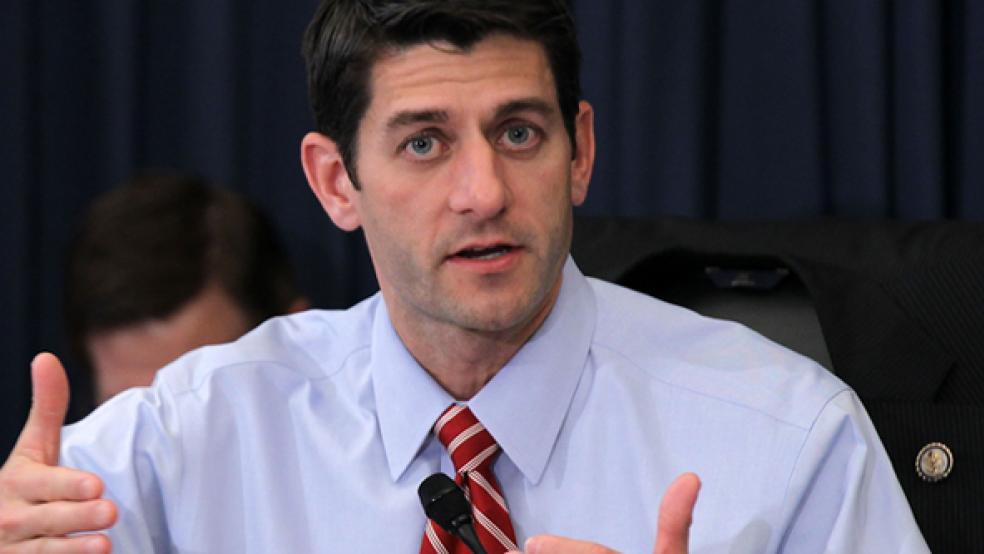If Republicans seriously think they can sail to victory in the mid-term elections this fall by simply not rocking the boat, they have a strange way of showing it.
Less than a week after House Ways and Means Committee Chairman Dave Camp unveiled a bold albeit ill-fated tax overhaul plan that would cut rates and eliminate scores of popular tax breaks and loopholes, House Budget Committee Chairman Paul Ryan is getting ready to reprise his long-standing cost saving plan on major federal entitlements.
Related: Will a Two-Year Budget End Fiscal Fights?
In an apparent rejoinder to President Obama's vow to close the gap between the very rich and the poor and middle class, Ryan on Monday released a 204-page critique of the federal government's anti-poverty policies. Ryan's report, coming a day before Obama releases his fiscal 2015 budget plan – essentially lays the groundwork for a renewal of House Republicans' efforts to overhaul or dismantle many long-standing social programs, including Head Start and Medicaid.
The report, titled, "The War on Poverty: 50 Years Later," provides a scathing analysis of eight areas of federal assistance policy: cash aid, education and job training, energy, food aid, health care, housing, social services and veterans affairs. It comes a half-century after President Lyndon B. Johnson declared an “unconditional war on poverty.” The report hammers current federal policies and will be followed up by specific proposals for consolidating, overhauling or eliminating programs – or simply returning them to the states when Ryan releases his budget proposal later this year.
“Despite trillions of dollars in spending, poverty is widespread,” the report states. “In 1965, the poverty rate was 17.3 percent. In 2012, it was 15 percent. Over the past three years, ‘deep poverty’ has reached its highest level on record. About 21.8 percent of children live below the poverty line.”
Today, the federal government’s anti-poverty programs are duplicative and complex, the report states. There are at least 92 federal programs designed to help lower-income Americans. For instance, there are dozens of education and job-training programs, 17 different food-aid programs, and over 20 housing programs. The federal government spent $799 billion on these programs in fiscal year 2012.
Related: Unemployment Insurance Extension Still in Doubt
"This document is a precursor not only of our budget but of our larger project to introduce poverty reforms over the course of this year," Ryan told The Washington Post. "The president may focus on inequality because he can't talk about growth. We're focused on upward mobility, speaking directly to people who have fallen through the cracks."
Just as Camp crafted his plan without Democratic input, Ryan and his staffers have worked behind the scenes to devise a set of proposals certain to invite bitter attacks from the Democrats as the campaign heats up. And just like Camp’s tax overhaul proposal, Ryan’s proposals will become little more than political talking points.
Ryan, the Wisconsin budget whiz, has been waging a crusade to rewrite federal welfare and health care laws as part of his “Path to Prosperity” well before the Republicans took control of the House in January 2011.
“The safety-net system created in the last century is in dire need of a new round of reforms,” Ryan wrote in the fiscal 2013 budget blue print he unveiled in March 2012 -- six months before he was tapped by Republican Mitt Romney as his vice presidential running mate. “Republicans, Democrats and independents all believe in a sturdy safety net for those who, through no fault of their own, have fallen on hard times. The debate is over how best to strengthen and improve it. In particular, it is essential to prevent benefit structures from becoming barriers to upward mobility.”
Related: Obamacare Penalty: 4 Things You Don’t Know
The House approved Ryan’s blueprint that month on a strict party-line vote of 228 to 191. House Speaker John Boehner (R-OH), House Majority Leader Eric Cantor (R-VA) and even Romney hailed it as important framework for the GOP’s national platform.
The Obama administration and liberal budget advocacy groups voiced alarm that in the name of deficit reduction, House Republicans were seeking to repeal the president’s health care reform law, slash overall Medicaid spending 30 percent or more by 2022, and cut spending for food stamps, college aid and education and job training.
Less than 24 hours after Romney chose Ryan as his running mate in August 2012, the former Massachusetts governor’s campaign was already trying to distance itself from Ryan’s politically toxic budget plan. Campaign officials insisted that Romney “will be putting together his own plan for cutting the deficit and putting the budget on a path to balance.”
Not surprisingly, Romney wasn’t eager to assume responsibility for Ryan’s ideas. Romney hadn’t issued a real budget plan of his own and appeared to have no interest in doing so before the election, perhaps for fear that voters might realize how little they would like it.
Related: Medicare Execs Are Overpaying $35 Billion a Year…and They Don’t Seem to Care
Ryan’s Medicare plan would have turned the program into a voucher system that would pay beneficiaries a fixed amount for their medical care, a move that would leave them on their own if the voucher did not cover their costs. This idea generated so much alarm from the public and seniors’ groups that Ryan was forced to backtrack and leave the existing Medicare system as an option.
Top Reads from The Fiscal Times:






